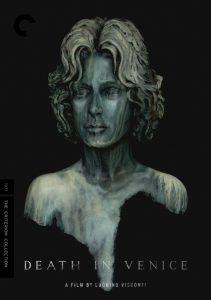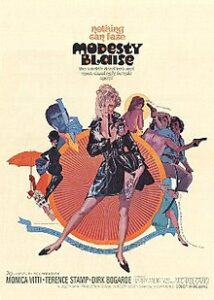Death in Venice-1971
Director Luchino Visconti
Starring Dirk Bogarde, Björn Andrésen
Top 250 Films #248
Scott’s Review #1,014
Reviewed April 22, 2020
Grade: A
Death in Venice (1971) is a haunting and tragic story of a depressed middle-aged man who becomes obsessed with a fourteen-year-old Polish boy while on holiday in Venice.
The story, on the surface, is dark and dour, not for the judgmental or the closed-minded. With a deeper dive and a haunting musical score, the film provides beauty and impressionism.
The film is based on the novella Death in Venice by German author Thomas Mann, published in 1912 as Der Tod in Venedig.
Gustav von Aschenbach (Dirk Bogarde) is a lonely composer who travels to Venice for health reasons and a recipe for recovery. His maladies are unclear at the start, but are assumed to be sent to the picturesque city as a form of therapy.
While enjoying a tranquil holiday, he spots Tadzio (Björn Andrésen), a stunning, youthful beauty staying with his family at the luxurious Grand Hôtel des Bains, just as Gustav is.
Their encounters run rampant as they are viewed by the audience from afar, but never speak to each other.
This is the brilliance of Death in Venice. A more standard approach may have been to make the story more forceful.
If Gustav had approached, harassed, or even molested Tadzio, the direction of the film would have vastly changed, and he would have been deemed a pervert.
Suddenly, the film would have been about a pedophile preying on a youngster, rather than incorporating a beautiful subtext of longing and unfulfilled passion.
The masterful classical numbers that open and close the film help to achieve this mindset.
The controversial subject matter, still taboo by today’s progressive standards, is not gratuitous but is quite obsessive. Worthy of mention is that Gustav’s plight begins harmless enough as he appreciates a beautiful image, almost like gazing at a sculpture- think Michelangelo’s David- since we are in Italy.
But when he begins to follow Tadzio and see him more and more, his desperation increases as his health deteriorates. For a while, it is unclear whether the boy even realizes he is an object of affection. It is Gustav’s feelings and emotions that are most explored.
As a side story, the city of Venice is gripped by a cholera epidemic, and the city authorities do not inform the holiday-makers of the problem for fear that they will flee the vital city.
In 2020, amid the vicious COVID-19 pandemic gripping the world, this classic film takes on a whole new importance. As Venice officials downplay the epidemic while tourists increasingly fall ill, a modern realism is conjured for the audience.
Death in Venice, as the title should make clear, is not a love story; otherwise, it would be called Love in Venice. Gustav’s lust for Tadzio is unrequited. Neither is Gustav’s sexuality clear, though he is assumed to be bisexual.
In one of the film’s saddest scenes, also the finale, Gustav lounges on the sandy beach in ill health, dressed in an improper white suit. He sees Tadzio playfully frolicking with an older boy, and afterward walks away and turns back to look at Gustavo.
As Tadzio outstretched his arms toward the water, Gustav did the same as if he was enveloping the boy. The moment is breathtaking.
Many symbolic and meaningful scenes occur, like when Gustav visits a barber who insists he will return his customer to his youth. The results are ghastly.
Dyeing his grey hair black, whitening his face, and reddening his lips to make him look younger leaves a macabre, somber image of a man feebly attempting to turn back the hands of time, something we can all relate to. His heavily made-up face is meant to hide his insecurities.
Incorporating an ingenious mix of beauty, tragedy, obsession, and loneliness, Italian director Luchino Visconti crafts a brilliant and painful dissection of human emotion.
The subject matter of Death in Venice (1971) will not appeal to all viewers. Still, those brave enough to traverse the sometimes-rocky waters will find an underlying treasure and a meaningful cinematic experience.
Oscar Nominations: Best Costume Design

